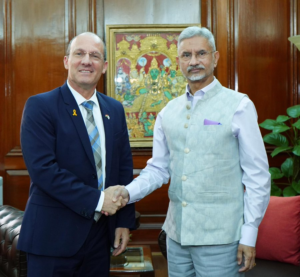UK approves world’s first gene therapy for sickle cell disease, beta thalassemia
London [United Kingdom], November 16 (ANI): Medical regulators in the UK have approved a gene therapy, that aims to cure two blood disorders-sickle-cell disease and beta-thalassemia.
After rigorous testing on safety, quality and effectiveness, Britain’s Medicines and Healthcare products Regulatory Agency (MHRA) has authorised the world’s first gene therapy, that will work to treat sickle-cell disease as well as B-thalassemia in patients aged 12 and above.
The medicine called Casgevy utilises the innovative gene-editing tool CRISPR.
Inventors of the ground-breaking tool, Emmanuelle Charpentier and Jennifer Doudna were awarded the 2020 Nobel Prize.
Both sickle cell disease and B-thalassemia are genetic conditions caused by errors in the genes for haemoglobin, which is used by red blood cells to carry oxygen around the body.
“Sickle cell disease is particularly common in people with an African or Caribbean family background. B-thalassemia mainly affects people of Mediterranean, south Asian, southeast Asian and Middle Eastern origin,” Britain’s Medicines and Healthcare products Regulatory Agency (MHRA) said on Thursday.
MHRA Interim Director Julian Beach said in the statement that both sickle cell disease and beta-thalassemia are painful, life-long conditions that in some cases can be fatal. “To date, a bone marrow transplant – which must come from a closely matched donor and carries a risk of rejection – has been the only permanent treatment option,” Beach said.
The CRISPR system has been called “genetic scissors”, which will be able to resolve the genetic coding holding sickle cell disease and B-thalassemia. These genetic errors can lead to “attacks of very severe pain serious and life-threatening infections, and anaemia”
The Casgevy medicine will edit the faulty gene in a patient’s bone marrow stem cells, enabling the body to produce functioning haemoglobin. In order to achieve this, the stem cells will be removed from the bone marrow of the patient, edited in a laboratory and then re-infused with the patient, with potentially life-long results.
Chief Executive of the Sickle Cell Society, John James OBE said, “There are limited medicines currently available to patients, so I welcome today’s news that a new treatment has been judged safe and effective, which has the potential to significantly improve the quality of life for so many.”
In trials, 28 out of 29 sickle cell patients were free of severe pain and 39 of 42 beta thalassemia patients no longer needed blood transfusions for at least a year.
The MRHA will continue their thorough monitoring of the novel medicine, testing its safety and effectiveness, through data and post-authorisation safety studies being carried out by the manufacturer.
The authorisation of Casgevy was endorsed by the UK government’s independent scientific advisory committee, the Commission on Human Medicines, after a robust review of the available evidence.






